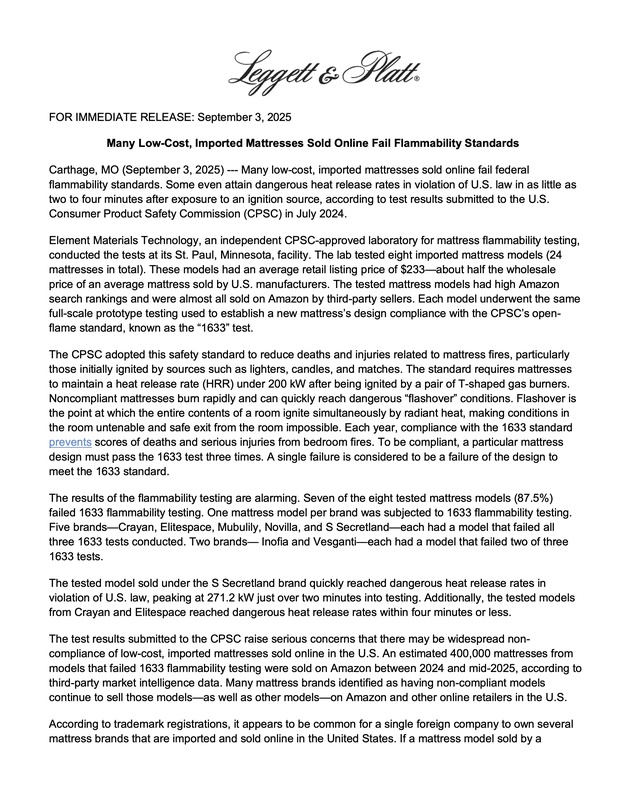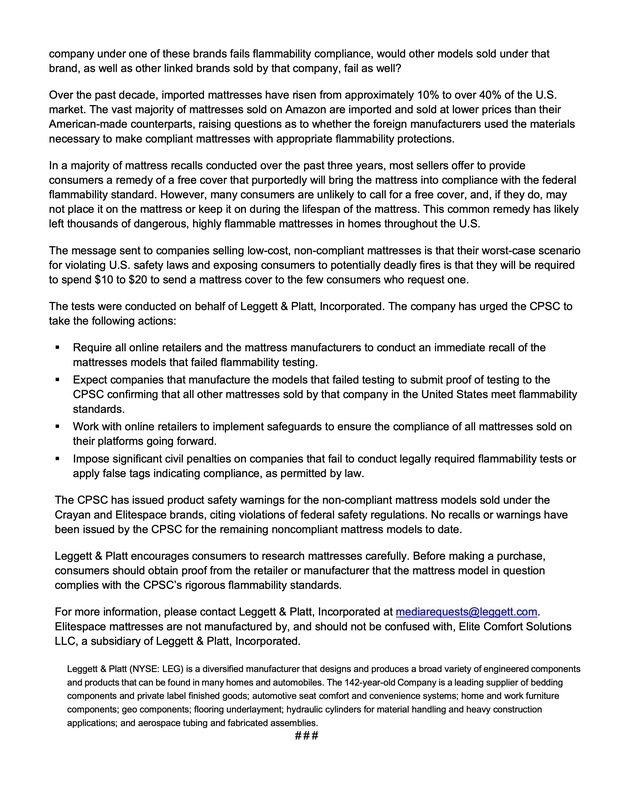Cheap Online Mattresses
What to Know Before You Buy
In recent years, cheap mattresses have flooded the internet. Most are imports from low-cost manufacturing countries like China, though some are manufactured in the United States as well. They have no-name ('generic') brands and simple designs, but tend to make big marketing claims and often have seemingly great customer reviews. Given how confusing and difficult it can be to purchase a mattress, these products can be tempting options for many consumers. But before you consider going down this road, you should at least know the truth about what you'd be getting.
The Truth about Reviews of Cheap Online Mattresses
When it comes to cheap online mattresses, one of the factors that can lead people to purchase them is customer reviews. These reviews are typically found on places like Overstock, Wal-Mart, Wayfair, or Amazon. Much has been written about the veracity of Amazon reviews, so we won't belabor the point that Amazon has struggled mightily to keep companies from flooding its platform with fake reviews that artificially inflate star ratings and review counts. However, it should be noted that this problem is not limited to Amazon. In fact, because it is particularly glaring with products imported from overseas companies, it can be a big issue anywhere cheap online mattresses are sold.
But separate from this general point, reviews of cheap online mattresses have much bigger issues. We are all accustomed to using star ratings to guide our purchases of various products. So why is this a problem when it comes to cheap online mattresses?
Self-Selection Bias
First, there is the self-selection problem. None of the leading online marketplaces provide expert guidance about mattresses, nor do any credible independent experts provide coverage of the countless ephemeral mattress brands they sell. Thus, anyone who purchases a generic online mattress from one of these sites is willing to roll the dice without any expert information or evaluations to go on, let alone the ability to test and compare different products themselves. As such, they have self-identified as someone who has minimal requirements from their mattress. In addition, because these shoppers spent the lowest possible amount, they will by definition have the lowest possible expectations.
Together, these factors mean that reviewers of mattresses on Amazon et al are extremely easy to please. Relative to other consumers who choose to review their mattress, they are undoubtedly the easiest graders on the internet.
Premature Timing Bias
Second, there is the problem of when these reviews are collected. Reviews on Amazon-like sites are typically submitted in response to a review request, which arrives shortly after you receive the product. At this point in time, none of the most important aspects of a mattress can be assessed.
- Does it provide good back support? No way to know – back pain resulting from improper spinal alignment can take weeks or months to develop (and unfortunately, even longer to fix).
- Does it keep you cool? Won't be clear till the first heat wave of summer rolls around.
- Will it hold up? A mattress should maintain its comfort and support for years. So by definition, it will take years to know whether it really did.
Key Take-Away
The star ratings you see for cheap mattresses on sites like Amazon are not a reflection of the actual quality or performance of these products. Because of who wrote them, they aren't representative of what an average consumer's experience would be on these mattresses. And because of when they are written, they can offer little to no insight into the factors that most consumers care about anyway. The only thing they can accurately describe is the experience of receiving and unboxing the product (which, for what it's worth, is virtually identical for any online mattress).
The Truth about Cheap Online Mattress Claims
The mattress industry has long suffered from a lack of standards and third-party validation for marketing claims. This is a problem that hurts consumers, who need to know which products really meet their needs. In turn, it also hurts manufacturers, who aren't able to get full credit when their products really do deliver against their claims. These are some of the key reasons that GoodBed created the mattress industry's first ever scientific testing program in collaboration with Dow.
The ultra cheap boxed mattresses that have flooded the internet in recent years are the extreme embodiment of this problem. They come with flowery product descriptions (provided by the manufacturers) that make the exact same claims as higher quality products do — supportive, pressure-relieving, cooling, long-lasting, etc. Most industry insiders know these claims to be completely false. But without any independent testing, expert guidance, or even a salesperson to assist them in their shopping, a consumer browsing these products online has no way to know this.
Amazon Mattresses Fail Consumer Safety Testing
Recently, some of the glaring problems with these products have started coming to light. In mid-2025, the Consumer Product Safety Commission (CPSC) issued recalls on a number of popular Amazon mattresses for failing to meet federal safety standards, advising consumers to cease use of these products immediately.
Subsequently, Leggett & Platt, a public company that has served the mattress category since 1883, performed its own tests of some of the most popular mattresses on Amazon. Their published findings are shown below. Critically, of the 8 mattresses that were tested, 7 of them failed 1633 flammability testing. According to Leggett & Platt, "each of the tested mattress models had high Amazon search rankings and were almost all sold on Amazon by third-party sellers. Each model underwent the same full-scale prototype testing used to establish a new mattress’s design compliance with the CPSC’s open-flame standard, known as the '1633' test."
Key Take-Away
In our view, there are multiple reasons that consumers should be extremely alarmed by the testing done by the CPSC and by Leggett & Platt. First and most obviously, these safety standards are there for a reason, and clearly these products fail to meet those standards.
Even more importantly though, what else do these failures say about these products? Passing basic flammability testing is literally the ONLY legal requirement for selling a mattress in the United States. If these mattresses are not doing the one thing that they are legally required to do, can you place any faith whatsoever in the other things they claim to do? Can you believe the statements they make about whether they use fiberglass in their products? Can you really trust their voluntary adherence to programs like CertiPUR-US®? And of course, if you can't even believe their claims that are required by law, how can you put any stock in their many flimsy claims that are not — e.g., back support, pressure relief, durability, and the like.
Equally disturbing is the fact that Amazon has done so little to police these violations. Thanks to the sales of ultra-cheap imported mattresses like these, Amazon may be the largest unit seller of mattresses in the entire country. One would think this volume would cause them to look more closely at the products they're selling. And yet, one of the products recalled by the CPSC was Amazon's own house brand of mattresses – Amazon Basics. On top of that, the results of Leggett & Platt's testing suggest that Amazon has completely failed to ensure that the mattresses they sell are even legal, let alone safe to be in a consumer's home. And of course, it was Amazon's utter failure to provide consumers with expert guidance about its mattresses that led to the proliferation of low-quality mattresses like these in the first place.
By and large, the mattresses sold on Amazon are generic, no-name brands. As such, these brands can easily be abandoned when information like this comes out. Unfortunately, they will just as quickly be replaced with new generic mattress brands that are similarly low quality and likely just as dangerous. In many cases, they may even be made by the very same manufacturers.
Overall, the information brought to light by these findings raises two key questions that every mattress shopper should consider. First, is it worth the risk to buy an ultra cheap imported mattress? And second, can you trust Amazon as a seller of mattresses? From GoodBed's perspective, we need to see much better from these companies.














































